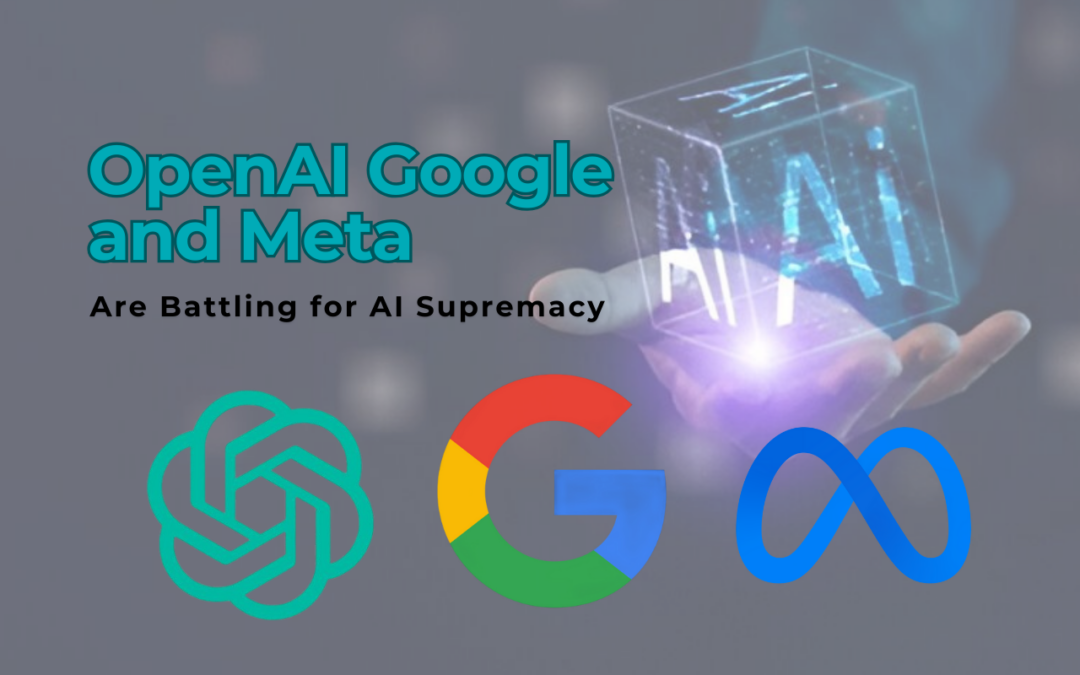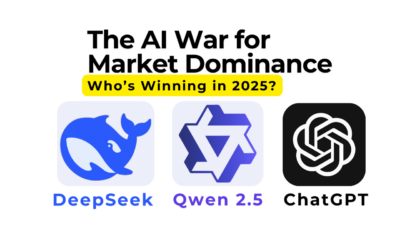Artificial intelligence (AI) is no longer a futuristic concept—it is shaping our present and defining our future. The AI arms race has intensified, with tech giants OpenAI, Google, and Meta locked in fierce competition to dominate the market. Each company is deploying massive resources, cutting-edge research, and strategic innovations to gain an edge in the AI battlefield.
In this blog, we’ll explore how these industry leaders are vying for AI supremacy, their key strategies, and what this means for businesses and consumers in 2025 and beyond.
OpenAI: The AI Disruptor
1. Pioneering AGI and Language Models
OpenAI, backed by Microsoft, has been at the forefront of artificial general intelligence (AGI) research. The company revolutionized AI with its GPT series, with ChatGPT becoming a game-changer in the AI chatbot landscape. OpenAI continues to push the boundaries of natural language processing (NLP), developing models with increased reasoning capabilities and multimodal functionalities.
2. Strengths and Competitive Edge
- Advanced Language Models: GPT-4 Turbo and upcoming iterations set new benchmarks in AI-generated content and conversational AI.
- Strategic Partnerships: OpenAI’s deep integration with Microsoft (Azure AI, Copilot, and Office tools) gives it a strong enterprise foothold.
- Developer-Focused Approach: The API ecosystem enables widespread AI adoption among startups and enterprises.
3. Challenges and Limitations
Despite its rapid progress, OpenAI faces challenges such as:
- Ethical AI concerns and biases in its models
- Dependence on Microsoft for infrastructure
- Increasing competition from open-source AI models
Google: The AI Titan with a Search Empire
1. Deep AI Integration Across Products
Google, with its vast data ecosystem, has incorporated AI across all its products, including Search, Google Assistant, Gmail, and Workspace. Google DeepMind, the research arm of the company, has pioneered breakthroughs in reinforcement learning and protein folding (AlphaFold).
2. Strengths and Competitive Edge
- Gemini AI (formerly Bard): OpenAI Google and Meta, offering deep integration with Search and other Google services.
- AI-Powered Search: Google Search’s shift toward AI-generated summaries and contextual responses aims to redefine the search experience.
- AI in Cloud Computing: Google Cloud Vertex AI provides enterprise AI solutions, competing with Microsoft Azure and Amazon AWS.
3. Challenges and Limitations
- Gemini’s mixed reception and performance inconsistencies compared to GPT models
- Privacy concerns and regulatory scrutiny over data usage
- Internal restructuring within Google’s AI teams (DeepMind and Google Brain merger)
Meta: The Open-Source AI Advocate
1. Building an Open AI Ecosystem
Meta has taken a distinct approach by championing open-source AI models. Its Llama series (Llama 2 and upcoming Llama 3) competes with OpenAI’s proprietary models, offering developers an alternative that balances performance and accessibility.
2. Strengths and Competitive Edge
- Llama Models: Free-to-use AI models that foster innovation across startups and research communities.
- AI-Powered Social Media and VR: AI is deeply embedded in Meta’s ecosystem, optimizing content delivery across Facebook, Instagram, and WhatsApp.
- Metaverse and AI Convergence: AI-driven avatars, AR/VR experiences, and digital assistants power Meta’s long-term vision for the Metaverse.
3. Challenges and Limitations
- Monetization struggles with open-source AI models
- Lower adoption rates in enterprise AI compared to OpenAI and Google
- Skepticism around the Metaverse’s long-term viability
The Future of AI: Who Will Win the AI War?
The AI war is not just about building the best model—it’s about ecosystem dominance, strategic partnerships, and ethical considerations. Here’s how the battle might unfold:
- OpenAI’s Future: Will it maintain its lead in generative AI, or will competitors catch up?
- Google’s Strategy: Can it successfully integrate AI into search without disrupting its ad revenue model?
- Meta’s Bet on Open-Source: Will open-source AI models become the industry standard?
Ultimately, the AI war will be won by the company that delivers the most accessible, ethical, and high-performing AI solutions. Businesses and consumers should closely watch this battle, as the outcomes will shape how we work, interact, and innovate in the years ahead.
Final Thoughts
AI is evolving rapidly, and competition between OpenAI Google and Meta is driving unprecedented innovation. Whether you’re a business leader, investor, or AI enthusiast, staying updated on these AI power struggles is crucial.
Who do you think will win the AI war? Let us know in the comments!












